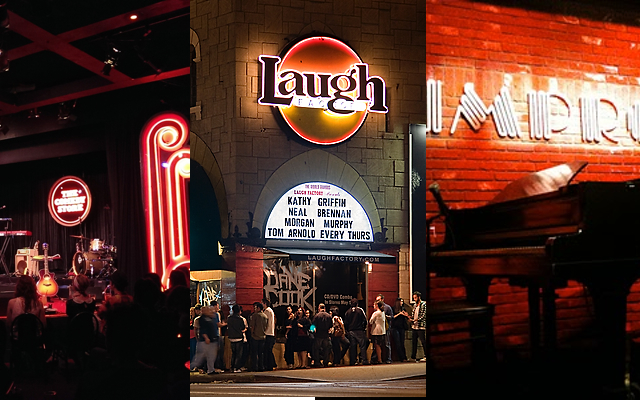Out of the Tarpit: The Rebirth of the LA Comedy Club Scene


A few years ago, anyone paying attention to the stand-up scene in Los Angeles would have been within their rights to think that the clubs were aging dinosaurs, sinking slowly to their death in a tar pit they’d never be able to escape. The Big Three (The Comedy Store, the Improv and the Laugh Factory) were not having their better days and it seemed like everything they did to get unstuck just made them sink deeper and deeper. But today, business is booming, with the clubs drawing stronger audiences to watch a broader range of comedians and really reasserting their relevance in comedy and pop culture.
The Decline of the LA Comedy Club Scene
By 2010, the Seinfeld -era Comedy boom had gone bust, and the club showcase was no longer the gatekeeper or guarantee of stardom.
Even as the current comedy boom began to re-boot in earnest, the expensive parking, two-drink minimums and repetitive lineups of the same small group of comedians at the clubs were not drawing in new fans. They were more used to free shows with free beer and a broad range of talent that was being overlooked by set-in-their ways club bookers.
By 2012, when the Hollywood Improv shut down the Improv Lab, things were looking even more grim.
Certain franchise shows like Comedy Juice at The Improv, Trippin on Tuesdays at The Comedy Store and Fresh Faces at The Laugh Factory continued strong showings. The Laugh Factory, with its relentless marketing machine, also still had lines of Hollywood douches out the door every night. But the other clubs would often see anemic crowds of hostile or bored tourists on off nights and early shows. Even the smaller Jon Lovitz Club, with its prime foot traffic spot at Universal CityWalk, was being run into the ground by mismanagement and a roster of terrible bringer shows. In stark contrast, independents like The Meltdown with Jonah and Kumail, Performance Anxiety, Holy Fuck! and Venice Underground were regularly at capacity, full of enthusiastic fans and building loyal, repeat visitors.
The LA Comedy Club Scene Turnaround
Then, somehow, it all started to turnaround. After a disastrous management change at the Improv, Reeta Piazza returned to the helm and the heartbeat of the club. Artistic Director Jamie Flam worked with the successful independent shows like Loud Village and Comedy Living Room to bring their brands and their crowds into the club. They simultaneously started bringing in a broader range of headliners like Jay Larson, Brody Stevens and James Adomian, worked in new formats like Comedy Rap Battle, Skinny Sundays and Van Jam, and even provided nights to showcase younger talent.
Everything is cyclical, even comedy, and that wheel is turning in an upward direction right now.
The Laugh Factory dabbled in bringing in the alt scene with Dot Comedy, but eventually decided to play to their strong suit with high profile shows like New Material Night with Kevin Nealon and Breaking Balls with Dom Irrera. Lovitz retooled a few times, first putting more focus on their podcast network, then bringing in LA Comedy Mama, Dee Burdett, who has worked to sweep away the bringers, book hot talent that may not be getting play at other clubs, and form strategic media partnerships.
 There are even new clubs sprouting up. Jeru Tillman and Chris Spencer, the duo behind the long-running Trippin on Tuesdays show at The Comedy Store, moved on and founded Inside Jokes last summer, which seems to still be experimenting with exactly who it wants to be, but already has high-powered supporters like Russell Simmons and Russell Peters and a lot of loyalty from LA comedians.
There are even new clubs sprouting up. Jeru Tillman and Chris Spencer, the duo behind the long-running Trippin on Tuesdays show at The Comedy Store, moved on and founded Inside Jokes last summer, which seems to still be experimenting with exactly who it wants to be, but already has high-powered supporters like Russell Simmons and Russell Peters and a lot of loyalty from LA comedians.
There was a little good luck in there, too. Club staples like Steve Rannazzisi, Chris D’Elia, Whitney Cummings, Adam Devine and Erik Griffin all became household names on TV. Comedians like Marc Maron, Joe Rogan, Ari Shaffir, Jay Larson, Ryan Sickler, and Jen Kirkman amassed vast and fiercely loyal fan bases via their podcasts. And @midnight began providing one of the best platforms for television exposure to transition fans from seeing you on TV to coming to see your stand-up.
Everything is cyclical, even comedy, and luckily for LA clubs, that wheel is turning in an upward direction right now.
Read more comedy news, stories, interviews with comedians, videos and comedy clips on our home page. Get more comedy news. Watch more viral videos. Read more interviews with the best comics in the business.
.
Latest posts by Amy Hawthorne (see all)
- Mike Cannon’s Field Guide to Doing Drugs - September 6, 2017
- Ryan Hamilton’s Long Road From VHS to Netflix - August 29, 2017
- Brent Morin Gets Unplugged at Just for Laughs Solo Show, Makes the Most of Rough Conditions - July 28, 2017
